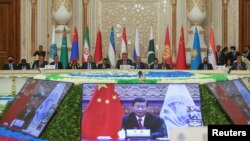Saudi Arabia has agreed to join the Shanghai Cooperation Organization as a "dialogue partner," state media reported Wednesday, the latest indication of closer political ties with China.
The Shanghai Cooperation Organization was established in 2001 as a political, economic and security organization to rival Western institutions.
Besides China, its eight members include India, Pakistan and Russia, as well as four central Asian countries: Kazakhstan, Kyrgyzstan, Uzbekistan and Tajikistan.
The Saudi Cabinet approved the decision at a meeting Tuesday chaired by King Salman, the official Saudi Press Agency reported.
The move would grant Riyadh "the status of a dialogue partner in the Shanghai Cooperation Organization," it said.
Other countries with either observer or dialogue partner status include Egypt, Iran and Qatar.
Riyadh's move to partner with the bloc comes less than three weeks after the unveiling of a landmark China-brokered reconciliation deal with Iran to restore full diplomatic relations that were severed seven years ago.
Long bitter rivals, Shiite-majority Iran and mainly Sunni Saudi Arabia have engaged in a series of proxy conflicts in the region, such as the protracted fighting in Yemen.
Riyadh has said that while it had engaged in previous rounds of bilateral talks with Tehran, the reconciliation process was jump-started by President Xi Jinping's offer last year to serve as a bridge between the two Middle East heavyweights.
Xi's role in the rapprochement raised eyebrows given Saudi Arabia's traditionally close partnership with Washington, though that relationship has been under strain recently because of disputes over human rights and oil production.
In Washington, State Department spokesman Vedant Patel played down the impact of Saudi Arabia's move, saying that it was long expected.
"Each country has its own relationships," Patel said.
Xi, in a phone call on Tuesday with Saudi Crown Prince Mohammed bin Salman, King Salman's son and the Persian Gulf nation's de facto ruler, lauded what he called the easing of tensions in the Middle East.
In his first comments on the matter to be made public since the Saudi-Iran deal was struck, Xi said the dialogue promoted by China would "play a major role in strengthening regional unity and cooperation."










